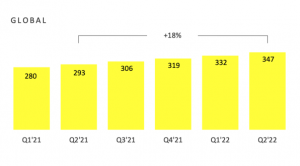As an executive coach, one reason clients come to me is to become more effective. This usually means mean improving their business acumen and leadership, new business growth strategies, or just finding a way to get more done.
Years ago, an entrepreneur hired me because they were bottlenecked and just not earning enough. We ended up doing a time audit. This driven entrepreneur was working 98 hours a week!
When asked what they thought their time was worth, they estimated $ 85 per hour. When we went through their schedule together, we were able to break their time into 13 categories of tasks. As we reviewed, we discovered that 12 of those buckets were essentially worthless to the business. They weren’t generating revenue through most of their business activities. However, their 13th bucket was worth $ 250 per hour. We uncovered a few strategies to bring that closer to $ 400 an hour.
After taking several other entrepreneurs and executives through the same exercise, I had to try it myself. I used Post-it® notes to write down my most recurring tasks; from meeting with clients to checking and sending emails, to driving and speaking at conferences. I broke my time into 18 recurring tasks; not all of which I did every single day. I discovered that my time could actually be worth less than $ 0 an hour! If I was driving to a meeting where I had to pay for parking and no sale occurred, that meeting was a fiscal loss – especially if I sprang for lunch! In these cases, my time could be costing me more than $ 50 per hour.
On the other hand, upon reviewing my biggest wins I was able to generate a $ 75,000 contract from one email that took two minutes to send. In a perfect world I could send 30 of those emails in 1 hour. That could make my time worth as much as $ 2.25 million dollars per hour. Quite a shocking revelation! More important than the realization of the worth of one’s time, is what to do with it. How dare a founder whose time could be worth $ 2.25 million per hour spend their time on tasks that cost the company money?
Like the clients I had taken through this exercise, my days were transformed. My to do list took on a whole new level of prioritization. I had a much more stringent filter to gauge how I spent my time. I was able to get more done working fewer hours, exercise more, and enjoy my life and my business more!
Before you go about auditing your time, don’t forget the notion of opportunity cost. Using the examples above, going for lunch and picking up the tab with someone who doesn’t become your client is not always a waste of money. Perhaps they are the key decision maker for their company and direct you to another department. Perhaps they end up becoming a great referral source for your business. Pick up the tab every time in those scenarios.
There is more to opportunity cost than simply landing business. Twenty three years ago, in my first business, I ran a very tight ship. Too tight. I didn’t understand the notion of opportunity cost. I would take a half-, or even a full day – to organize my expenses and get my business ready for tax filing. Back then, I owned a personal training company. I was working all day so that I could save (at that time) the $ 75 I’d have to pay a bookkeeper. What I (like so many entrepreneurs) failed to understand back then was the notion of opportunity cost. Even in 1998, I was charging $ 40 an hour for personal training. Had I booked even a half day of training, I would have brought in $ 160. Minus the $ 75 to the bookkeeper, I would have been in the black $ 85, and not hated every second of the day!
The same could be said for revenue generation. Back then, I was charging $ 100-$ 150 for a detailed fitness plan. After creating hundreds, I could do so in about twenty minutes. That made my time worth up to $ 450 an hour. My clients also wanted nutrition plans. Rather than outsource (one phone call) and keeping 10% as a referral fee, I did the plans myself. For the same $ 150, I was taking up to five hours to create these eating plans! Why be worth $ 30 an hour when you can be worth $ 450?
Having interviewed top performers in almost all walks of life, I’ve met several business leaders who consider driving to be one of their negative ROI activities. Most of us spend 60 to 120 minutes a day stressed out navigating traffic. For many professionals this could be much more when running from meeting to meeting in different parts of the city. For some, hiring a driver reduces stress, and allows them to get in extra productivity time. Some are even able to pull in enough additional revenue to more than offset the cost of the driver!
Idea into action
Now that the concept is clear, let’s review the methodology. To inject a degree of innovation into your time audit, scholars and authors alike are recommending Post-it® Notes. One reason not listed among the pro-Post-it® note advocates is ‘mental malleability’. If you use a computer, phone, tablet, or notebook, our brains are wired to write left to right, top to bottom. Ideas become words and sentences, and words and sentences become structures. Put another way, they become rules. It’s hard to be innovative – to challenge your own status quo – in a world of structures and rules.
Instead of defaulting to a predetermined structure, write each of your tasks on a separate Post-it® note. This allows you to group tasks, order and reorder them, and to just be – innovative. From there, try to assign a value to each task, whether it’s high on your passion and joy meter, or if you can assign a monthly or even hourly value to said task.
Whether in financial currency, or your second currency (what motivates you), rank your recurring tasks from most valuable, to least. Now comes the scary part. Compare how you spend most days to your list. Are you spending most of your time where it’s the most valuable? Most people don’t. The average person spends 28% of their time on email, which means more than two hours a day.
Of course, certain roles require repetitive tasks (like reconciling quarter- and year end for senior finance roles). That being said, most of us have a high degree of autonomy in our roles, trusted to use our time as we see best. Most of us can become more productive, if not more effective, happier, and even wealthier, by auditing our time and adjusting as we see fit.
Finally, times change, demands change, technologies and even societies change. If auditing and adjusting your time works for you, chances are it will work more than once. This is probably an “every January” undertaking much more than it is a ‘one-off’.
Cheers to your (increasing) productivity!
Business & Finance Articles on Business 2 Community
(20)





